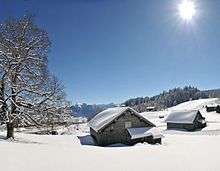Definify.com
Webster 1913 Edition
Winter
Win′ter
,Barren
Win′ter
,Win′ter
,Webster 1828 Edition
Winter
WINTER
,WINTER
,WINTER
,Definition 2026
Winter
Winter
English
Proper noun
Winter
See also
Anagrams
German
Etymology
From Middle High German winder, winter, from Old High German wintar, from Proto-Germanic *wintruz. Compare Dutch and English winter, Danish vinter.
Pronunciation
- IPA(key): /ˈvɪntɐ/
Noun
Winter m (genitive Winters, plural Winter)
Declension
Derived terms
- Winterweizen
- Winterruhe
- Winterschlaf
- Winterferien
- Winterurlaub
- Wintersturm
- Winterreifen
- Winterwetter
- Winterzauber
- Schneewinter
- Mittwinter
See also
| Seasons in German · Jahreszeiten (layout · text) | |||
|---|---|---|---|
| Frühling (“spring”) | Sommer (“summer”) | Herbst (“autumn”) | Winter (“winter”) |
winter
winter
English
Alternative forms
Noun
winter (countable and uncountable, plural winters)

- Traditionally the fourth of the four seasons, typically regarded as being from December 23 to March 20 in continental regions of the Northern Hemisphere or the months of June, July and August in the Southern Hemisphere. It is the time when the sun is lowest in the sky, resulting in short days, and the time of year with the lowest atmospheric temperatures for the region.
- a1420, The British Museum Additional MS, 12,056, “Wounds complicated by the Dislocation of a Bone”, in Robert von Fleischhacker, editor, Lanfranc's "Science of cirurgie.", London: K. Paul, Trench, Trübner & Co, translation of original by Lanfranc of Milan, published 1894, ISBN 1163911380, page 63:
- Ne take noon hede to brynge togidere þe parties of þe boon þat is to-broken or dislocate, til viij. daies ben goon in þe wyntir, & v. in þe somer; for þanne it schal make quytture, and be sikir from swellynge; & þanne brynge togidere þe brynkis eiþer þe disiuncture after þe techynge þat schal be seid in þe chapitle of algebra.
- 1592, Shakespeare, Henry VI, Part 1:
- And after summer evermore succeeds / Barren winter, with his wrathful nipping cold.
- 1785, William Cowper, “Tirocinium: or, A Review of Schools." in The Poems of William Cowper, Vol. II., The Press of C. Whittingham (1822), page 174:
- There shall he learn, ere sixteen winters old, / That [...]
- 1897, William Morris, The Water of the Wondrous Isles, Vol. I, Longmans, Green and Co. (1914), page 2:
- [...] a woman, tall, and strong of aspect, of some thirty winters by seeming, [...]
-
- (figuratively) The period of decay, old age, death, or the like.
- (Can we date this quote?), Wordsworth, (Please provide the title of the work):
- Life's autumn past, I stand on winter's verge.
-
Usage notes
- Note that season names are usually spelled in all lowercase letters in English. This is contrast to the days of the week and months of the year, which are always spelled with a capitalized first letter, for example Thursday or September.
Derived terms
|
|
|
|
Related terms
|
|
Translations
|
|
See also
| Seasons in English · seasons (layout · text) | |||
|---|---|---|---|
| spring | summer | fall, autumn | winter |
Verb
winter (third-person singular simple present winters, present participle wintering, simple past and past participle wintered)
- (intransitive) To spend the winter (in a particular place).
- When they retired, they hoped to winter in Florida.
- (transitive) To store something (for instance animals) somewhere over winter to protect it from cold.
Derived terms
Translations
|
Statistics
Anagrams
Dutch
Pronunciation
- IPA(key): /ˈʋɪn.tər/
Etymology
From Middle Dutch winter, from Old Dutch *wintar, from Proto-Germanic *wintruz. Compare West Frisian and English winter, German Winter, Danish vinter.
Noun
winter m (plural winters, diminutive wintertje n)
See also
Old English
Etymology
From Proto-Germanic *wintruz, whence also Old Frisian winter, Old Saxon and Old High German wintar, Old Norse vetr and vintr, Gothic 𐍅𐌹𐌽𐍄𐍂𐌿𐍃 (wintrus). Perhaps represents a nasalised variant of Proto-Indo-European *wed- (whence also English water, wet); but perhaps akin to Old English winistre (“left (side)”), with original sense possibly a cardinal direction or possibly "unfavorable" .
Pronunciation
Noun
winter m
- winter (season)
Descendants
Scots
Etymology
From Old English winter, from Proto-Germanic *wintruz.
Noun
winter (plural winters)
West Frisian
Etymology
From Old Frisian winter, from Proto-Germanic *wintruz. Compare Dutch and English winter, German Winter, Danish vinter.
Pronunciation
- IPA(key): /vĩtər/
Noun
winter c (plural winters)